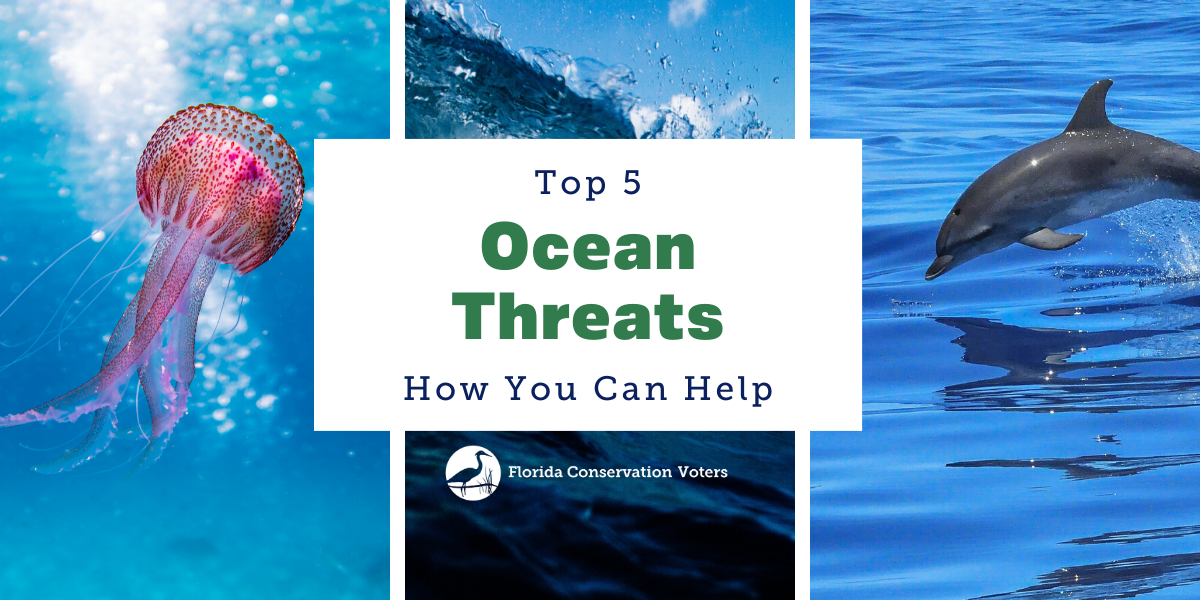Our oceans make life on Earth possible. They feed us, heat and cool us, and even supply the air we breathe. Without healthy oceans, we cannot survive. Our oceans are in peril, threatened by climate change, unsustainable use, pollution, offshore drilling, and a lack of protection. Read about the state of our oceans and how you can help save them.
Threats
- Climate change
Climate change is undoubtedly the biggest threat facing this planet. Climate change, caused by increased carbon in our atmosphere, causes warming waters, melting ice caps, sea level rise, intensified storms, and other impacts. Our changing climate will continue to have deadly impacts on the world’s oceans. Warming waters, even by only a couple of degrees, can lead to coral bleaching, loss of habitat, intensified weather events like hurricanes. As ice caps melt, we lose of habitat for arctic species like penguins and polar bears. In Florida, as sea levels rise due to warmer waters and melting ice, we lose habitat for species like beach mice, sea turtles, and shorebirds.
Everyone plays a role in calling for climate action. According to studies, young people, people of color, and women disproportionately care most about environmental and climate issues, and they are most supportive of stronger government policies to address them (Ballew et al., 2019). As constituents, we need EVERYONE to join the fight by contacting their legislators! - Unsustainable fishing
According to the United Nations, 93 percent of commercial fish stocks are being fished at or beyond capacity. Additionally, more than 1.4 million pounds of commercial fishing gear is dumped and discarded in the ocean every year. Fishing practices such as trawling unnecessarily kills many marine species every year, including dolphins, whales, and sea turtles.
Ocean policy is complicated. Never stop learning! Read books and articles, watch documentaries, and listen to talks and podcasts. Many organizations like Oceana, Surfrider Foundation, and Florida Waterkeepers chapters are doing tremendous work on behalf of our oceans. - Pollution
Plastic is the most prevalent type of marine debris found in our ocean. About 17.6 billion pounds of plastic ends up in the ocean each year. Whether it’s discarded at the beach or upstream, plastic is often consumed by fish and birds, eventually killing them. What happens on land makes its way to the water. Toxins from pesticides, fertilizers, and other chemicals used on land contaminate nearby rivers that flow into the ocean, which can cause extensive loss of marine life in bays and estuaries leading to the creation of dead zones. In Florida, blue-green algae and naturally-occurring red tide is made worse because of pollution.
Plastic is a huge threat to our oceans; one way we can help as individuals is to use less plastic. Check out FCV’s resources on how to reduce your plastic use. As consumers, we speak up with our wallets. Together, we must demand that corporations take responsibility for the pollution they have created. As an individual, you can buy products from companies that are making strides to use more sustainable packaging.
- Offshore oil drilling
Offshore oil and gas drilling threatens Florida’s water, wildlife, economy, and public health. Before drilling even begins, oil exploration hurts wildlife. In fact, seismic airgun testing blasts harm whales and dolphins. The BP Deepwater Horizon disaster in 2010 spewed more than 200 million gallons of oil into the Gulf of Mexico. When an oil spill occurs, the entire coastal economy suffers. The BP oil spill caused a $22.7 billion loss of tourism dollars. Florida voters banned all new offshore drilling operations in 2018, but only in state waters. Federal waters are still potentially open for business. Oil spills don’t stop at the state line and the Trump Administration has been eager to open drilling in previously undrilled areas. During the 2016 presidential campaign, the oil and gas industry spent more than $100M to lobby candidates and lawmakers.
Use our easy email form to contact your lawmakers right now: tell them that you’ll never forget the BP Oil Spill and you support a complete ban of all offshore oil and gas drilling nationwide. Take action here!
- Inadequate protections
Only 5.7% of the world’s oceans are designated as protected. A growing number of scientists are calling for the protection of at least 30 percent of the planet’s ocean by 2030. The movement to protect “30 by 30” within the United States has broad support from 86 percent of voters and will require action at all levels of government. Ocean sanctuaries preserve biodiversity and help marine species survive the impacts of climate change.
The power to save our oceans is in the hands of our elected officials. To protect our oceans, Conservation Voters can help support politicians who advocate for the environment. Our vote is our voice. Look out for FCV’s endorsements of state candidates in your area! To check the status of your congressional representatives, check out the League of Conservation Voters National Environmental Scorecard: https://scorecard.lcv.org/

